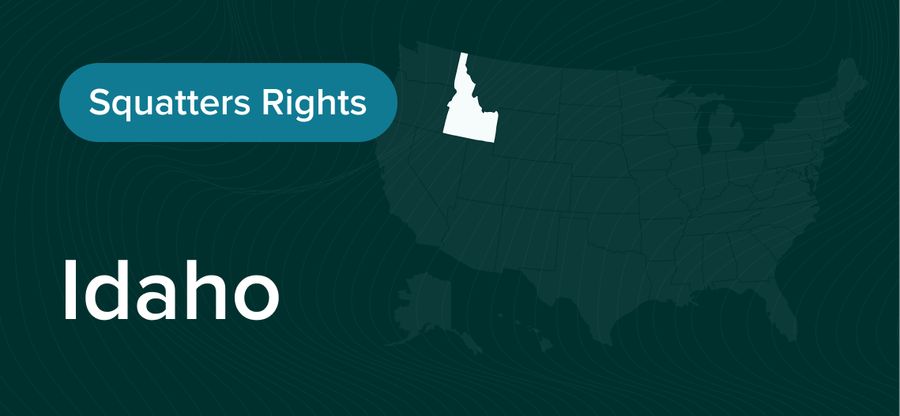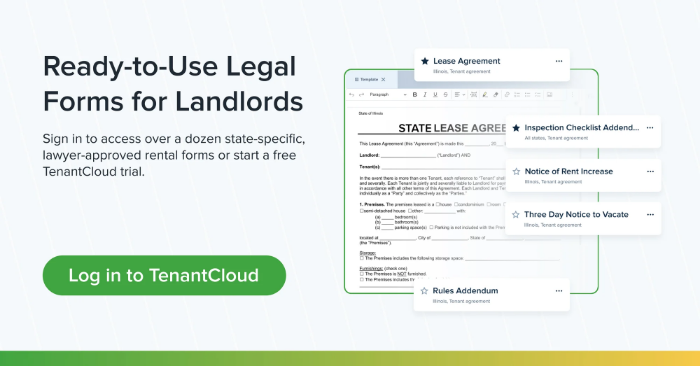If you’ve discovered someone living on your property without permission, it can be frustrating. But you’re not without options. For Idaho landlords, squatters can bring a host of complications: lost rental income, property damage, and the legal gray area of who actually holds the rights to the space. It’s an understandably stressful situation.

The good news is that Idaho law offers strong protections for property owners, as long as you know how to respond. Whether it’s a vacant rental between tenants or land you’ve inherited but haven’t yet developed, you have to act fast and understand how squatter laws work in the state.
In this article, we’ll break down squatters’ rights law, what adverse possession really means, and how to protect your property from unwanted occupation. We’ll also walk you through the legal steps to evict squatters and prevent future issues.
What Are the Legal Rights of Squatters in Residential Properties in Idaho?
When it comes to understanding Idaho squatters’ rights law, the first step is knowing exactly who qualifies as a squatter. In legal terms, a squatter is someone who occupies a vacant or abandoned residential property without permission from the property owner. They’re not the same as trespassers, who may enter but don’t reside on the property, nor are they holdover tenants, also known as renters who stay past the end of a lease agreement.
In Idaho, squatters can attempt to gain legal ownership of the property they occupy through a process known as adverse possession. This is a legal doctrine outlined in Idaho Code sections § 5-203 and § 5-210, which sets a very high standard.
To file a valid adverse possession claim, squatters must prove all five of the following:
- Hostile possession: occupying the property without a lease or consent
- Actual possession: physically living on and using the property
- Open and notorious: not hiding their presence; their occupancy must be visible
- Exclusive possession: not sharing the property with others
- Continuous occupation: at least 20 years of uninterrupted possession (or 5 years for land that’s improved or cultivated)
Beyond those conditions, Idaho law also requires squatters to pay the property taxes during the entire statutory period, possess color of title (a flawed but documented claim to the property), and make significant improvements, such as fencing, landscaping, or structural development. They may technically have a path, but in Idaho, it’s a long shot.
What Are the Rights of Landlords in Relation to Squatters in Idaho?
If you're a property owner in Idaho, the law is on your side. According to Idaho statutes, squatters must meet a long list of criteria to make a successful adverse possession claim, and the burden of proof falls entirely on them, not you. In most cases, a squatter’s attempt to gain property ownership fails because they cannot meet Idaho’s strict requirements.
As an Idaho landlord, there are several immediate actions you can and should take to protect your investment. First, clearly post “No Trespassing” signs around any vacant property you have. This helps establish legal boundaries and reinforces your intent to control access. Next, stay current on property taxes and perform regular inspections, especially for homes that are between tenants.
Prevention is key. Secure all entry points with sturdy locks, install motion-activated lighting, and keep landscaping maintained. Making your property appear occupied—by using light timers or visible upkeep—can deter unauthorized occupants from considering it as a potential residence.
To stay ahead of issues, many landlords go ahead with hiring a property manager or use property management accounting tools to monitor occupancy and expenses more efficiently. And, if you know that squatters can only claim ownership over the portion of the property they’ve used exclusively, you can take legal action quickly if needed.
Related: Idaho Evictions | Laws and Protections
What Are the Legal Procedures for Dealing with Squatters in Idaho?
If you discover a squatter on your property, taking swift, legal action is a must. Fortunately, Idaho law gives landlords clear tools for reclaiming possession. Before a squatter meets the 20-year (or 5-year for improved land) statutory period for adverse possession, you still hold the legal right to remove them through relatively streamlined procedures.
Preventative action should begin immediately. Start by serving a written notice—30 days is recommended—informing the squatter they are trespassing and must vacate. Send this notice via registered mail, then post a physical copy on your property. If they remain, you can escalate by contacting local law enforcement or filing a trespassing complaint.
If the squatter does not leave, that’s when you’ll need to initiate the Idaho eviction process. This will involve:
- Serving a formal 3-day or 30-day eviction notice, depending on your situation
- Filing a forcible detainer lawsuit (also called an unlawful detainer)
- Having the summons and complaint served at least 24 hours before the court hearing
- The court will schedule your hearing within 72 hours of filing
- If the court rules in your favor, a writ of restitution is issued
- Only the sheriff, not local police, is authorized to enforce removal
Keep in mind that evicting squatters is a legal process. If you don’t know how to proceed, seek legal advice to ensure you properly file and keep track of the eviction records. A legal expert can help you work through the Idaho eviction process and answer any questions you have along the way.
How to Strengthen Your Legal Position as a Landlord
In Idaho, being proactive can make a massive difference if you want to protect your property from squatters. Strengthening your legal position as a landlord starts with clear documentation and formal agreements that establish you as the legal owner of the real property in question.
Start with a strong foundation: use a formal, state-specific lease agreement for every tenant. Verbal or informal arrangements can make it harder to prove ownership or establish legal grounds for eviction. If you’re not sure where to start, begin by obtaining lease forms for Idaho that are easy to customize and legally sound.
Next, document everything. Keep copies of all notices, emails, payment histories, and inspection records. Even details like utility bills or property tax payments can support your claim as the rightful owner in court.
Avoid accepting rent from any unauthorized occupants, even if they offer it to you directly. Doing so may be tempting to maintain cash flow, but it can unintentionally create a landlord-tenant relationship that makes it harder for you. That’s why you should always require a signed lease agreement before allowing anyone to move in.
Finally, consider adding rent reporting to your business. It not only helps tenants build credit, but it also creates a trackable history that confirms legitimate occupancy for your investments. Being organized and intentional now can save you from legal headaches down the road.
Related: Squatters Rights Washington | Understanding Your Legal Position
Why Adverse Possession Exists in Idaho Law
While you might think these are relatively new pieces of legislation, they actually have a long history in the state. These laws were created long before property management fees were a common part of the real estate business. The concept dates to the Homestead Act and early American settler laws, which encouraged pioneers to occupy, improve, and cultivate unclaimed land.
The idea was simple: if someone put in the work to develop real property, they should eventually have a path to legal ownership, even without a formal deed. This approach was widely adopted across frontier states like North Dakota, South Dakota, and Idaho.
Adverse possession was originally seen as a viable way to reward productivity and discourage land neglect. By occupying and cultivating unused land, settlers could transform vacant lots into productive farms, thereby contributing to economic growth and community development.
Today, the landscape has transformed. While the law remains on the books, it’s rarely applied successfully. Idaho’s high land values, complex family law issues (like heir property), and structured zoning laws make valid adverse possession claims increasingly difficult to actually apply in context.
The Idaho Supreme Court has reinforced strict standards for squatters and squatter rights, and modern urban planning leaves little room for ambiguous property use. Still, occasional disputes do arise, especially in rural areas where properties may be unmonitored or abandoned.
FAQs About Idaho Squatter’s Rights and Adverse Possession
Understanding Idaho squatters’ rights can be complex, especially when legal and property questions start to overlap. Here are some of the most common questions people ask when dealing with unauthorized occupants in Idaho:
What’s the shortest time a squatter can claim ownership in Idaho?
Under Idaho’s adverse possession laws, a squatter can claim ownership after just five years, but only if the land is improved or cultivated. For all other property types, the standard statutory period is 20 years of actual possession.
Can paying property taxes alone qualify a squatter for ownership?
No. While consistent payment of property taxes is a required element under Idaho law, it doesn’t establish ownership on its own. Squatters must also meet other strict requirements, such as continuous, exclusive, and hostile possession.
What if the squatter only uses part of the property?
A squatter can actually file an adverse possession claim for just the portion they’ve used exclusively and become an adverse possessor. This often happens in disputes over heir property or shared land boundaries.
Do tenants with expired leases count as squatters?
Not typically. These individuals are referred to as holdover tenants and fall under different landlord-tenant laws. While they may eventually be evicted, their rights are not the same as squatters.
Can I evict squatters without hiring a lawyer?
Possibly, but it’s highly recommended to seek legal advice, especially if the squatter has been there for an extended period or is threatening to file a claim. The legal process can be technical, and mistakes can delay your ability to regain possession.
Related: Oregon Evictions | Laws and Protections
Protecting Your Property Starts with Preparation
While Idaho squatters’ rights law technically allows for adverse possession, the legal path is steep, narrow, and rarely successful. With long statutory periods, strict requirements, and a high burden of proof, few squatters ever gain legal ownership, especially when landlords stay informed and proactive.
If you’re maintaining your property, keeping up with lease agreements, and responding swiftly to unauthorized occupation, you’re already ahead of the curve. Most Idaho landlords will never face a successful adverse possession claim, but that doesn’t mean it’s safe to be passive.
Whether you own a single rental or manage multiple units, the best defense is consistency. Inspect properties regularly, post clear signage, keep documentation organized, and never allow informal tenants to stay in your residential or commercial properties. If your place is sitting empty or in a rural area, working with a trusted property manager can add another layer of protection.
Ready to safeguard your real estate investment and streamline your lease management? Try TenantCloud free for 14 days to see just how easy it is to stay in control.
___________________________________________________________________________
Disclaimer: TenantCloud does not provide legal advice. This content is for informational purposes only and should not be considered legal guidance. Users are responsible for reviewing all applicable local, state, and federal laws and consulting a qualified attorney with any legal questions.
___________________________________________________________________________




